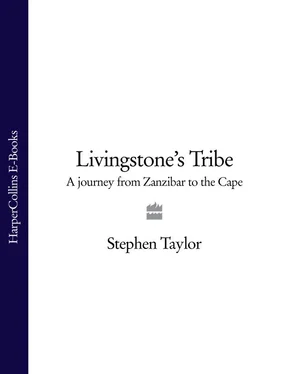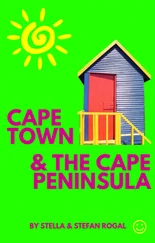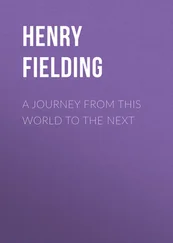It sounded desperately earnest.
‘Well,’ he barked. ‘It helps to be a little mad.’
I had heard of Daudi Ricardo long before the flight landed me that morning in Dar es Salaam. In Britain, where old district officers reminisced in their twilight on exotic human specimens who had crossed their paths, and in tales of post-colonial diehards, Daudi’s name had resonance. Once an English grandee, born David Ricardo, he had sacrificed everything on the pyre of Tanzania’s hopelessly inept experiment with socialism. Now in his seventies, he lived in genteel poverty in a shanty beside the beach twenty miles north of Dar es Salaam.
A single large palm tree stood in front of the whitewashed cottage. I took in the interiors of two adjacent rooms. They were of incongruous, almost paradoxical, character: a bedroom of missionary simplicity; and a book-lined study with a roll-top desk and leather chair. The shelves contained a near-complete set of G. A. Henty novels in the original gold-embossed covers.
‘Meshack, more coffee,’ ordered Daudi.
Once there had been a few other whites living in a ragged little colony at Kunduchi beach. But the major who used to see non-existent thieves in the dark and shout ‘I’ve got my artillery, Sir, and I won’t hesitate to use it’, had died, and the couple who smuggled birds and small creatures to foreign zoos had been forced to make a run for it. Daudi was the last mzungu at Kunduchi, sharing his roof with Meshack, a smiling-faced young man, his wife and their baby.
In the days I spent there it became apparent that Daudi had a variety of roles. To Meshack, he was paterfamilias and opponent in hard-fought games of backgammon and Monopoly. To his neighbour, Saidi, he was friend and confidant. To most local folk he was simply the mzee , an ancient revered as sage and occasional benefactor.
One evening, I related two stories about whites in South Africa.
In 1686, a richly laden Dutch vessel, the Stavenisse , was wrecked off the south coast. For many months nothing was heard of the ship and it was concluded that it had gone down with all hands. Then, three years later, another ship called on this storm-blasted stretch of coast and found Stavenisse survivors, living contentedly among an African people. The Europeans returned to the tiny Dutch settlement at the Cape of Good Hope with elegiac accounts of life in an Eden among peaceful and generous folk, having left behind a Portuguese mariner, shipwrecked in the same place forty years earlier, who had acquired a wife and children and declined to leave his idyll. ‘He spoke only the African language, having forgotten everything else, his God included,’ wrote a would-be rescuer.
Almost a hundred years later, in 1782, an East Indianman the Grosvenor was wrecked along the same stretch of coast on a return voyage from India. This time, however, the survivors were not welcomed. Out of 123 men, women and children to reach the shore, fewer than twenty eventually got back to the Cape, bearing harrowing tales of murder and persecution by pitiless savages.
These two accounts represented for me a characteristic of the European experience of Africa: arcadia or inferno – it seemed always to be one or the other, as if the place chose to reveal only a benign face to some, and a malign aspect to others. Rarely had the world seen a more baleful side of Africa than now, over the horizon in Rwanda. Yet here was a modern equivalent of the shipwrecked mariner, loved and enfolded by a kinship network. His other family – his wife, Lady Barbara Montagu-Stuart Wortley, daughter of the Earl of Wortley, and children – lived in England.
‘Africa has been kind to me,’ he agreed. ‘I won’t be going back to England to die. My life is short now. I have cancerous waterworks. Collapsed recently and spent two days on the floor in the local hospital.’ I knew enough about Tanzanian hospitals to marvel that, in the face of this final test, he had not submitted to the National Health Service.
The ambiguities were baffling: a white man who loved Henty, yet lived among blacks; a former settler serenely awaiting death in a land which old colonials saw as the final word in African failure. I asked him to start at the beginning.
DAUDI’S ANCESTOR WAS David Ricardo, the nineteenth-century economist whose prosperity built Gatcombe Park in Gloucestershire. The family was famously well-connected. ‘I have an early memory of being given a hiding by George V. Grumpy old chap. He’d come to lunch and afterwards he was dozing in a comfy chair. I wondered if the beard was real, so I gave it a tug. He woke up quick enough. Queen Mary was very nice though.’
At the outbreak of war, then himself named David, he joined the family regiment, the Irish Hussars, suffered fearful wounds in the desert campaign and went to Tanganyika to convalesce. There, in the Southern Highlands, he turned to ranching, founding Matanana, a fabled homestead in the bush adorned with touches of Gatcombe – Sèvres porcelain, portraits by Sir Peter Lely, and green and gold livery for the African footmen.
Then he began to act oddly. He had always been considered an eccentric but when he started to consort with Africans, to dress in native garb and disappear into the bush for weeks at a time, even the relatively unconventional settler society of the Southern Highlands took notice. He announced his conversion to Islam and with it a change of name from David to Daudi. At uhuru , he took Tanzanian citizenship and became a member of Julius Nyerere’s party. He handed over Matanana to his workforce and went to work for the people.
We mostly sat on the verandah because Daudi said it had a happy feeling about it. So it did, but I liked the study, with the sturdy oak desk, the swivel chair, its leather crackled and crisped by the tropics, and the walls of foxed and weathered books which ranged well beyond Henty. When he heard that I had written a biography of F. C. Selous, the Victorian hunter and adventurer, his face lit up. He dived into a pile of books and emerged delightedly with a distinctive green Bentley first edition of Selous’s A Hunter’s Wanderings , one of the great rarities of hunting literature.
I looked for other memorabilia – the odd picture, perhaps a piece of porcelain – in vain. ‘All gone,’ he said. Only one object did he mourn, a bronze of an Irish Hussar presented to his father by Edward VII. It had been stolen years ago, along with anything else of value. ‘The burglars don’t bother any more. They know there’s no money.’ He smiled with wry satisfaction.
Actually, there was not much food either. Once we ate fish and prawns at a small place down the beach and another time Meshack made a chocolate cake which fed five people, although one of them was Rodda, the baby. Daudi was down to his last fiver until he was paid some money owed to him. Not that there was anywhere to shop. Provisions came from Dar once a week.
‘Thank God there’s enough coffee,’ he said. By then, however, there was no water. The rains had failed and the borehole had expired. There was also no electricity. His last luxury was a cheap, pungent snuff which he took from a plastic film canister.
Once, sitting on the verandah in his customary attire of T-shirt and sarong, he produced an old photograph album. A yellowing snap showed the master of Matanana at the Tanganyika Cattle Breeders’ fair in 1958, a striking figure in plus fours, top hat and cravat. Now the homestead where liveried footmen had waited on guests was crumbling and Matanana had been reclaimed by the bush. ‘I went back recently. It was a bit melancholy. But there were still some of the old families and we had a few laughs.’
After leaving the ranch, he worked for twenty-five years among peasants, a field worker for development projects. Most were doomed by incompetence and corruption. Yet he had found the work personally fulfilling.
Читать дальше












